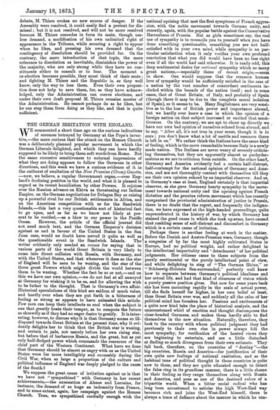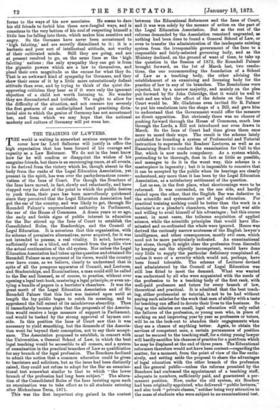THE GERMAN IRRITATION WITH ENGLAND.
AVE commented a short time ago on the curious indications of soreness betrayed by Germany at the Pope's invec- tive,--the more curious that the attack on the Roman Church was a deliberately planned popular movement in which the German Liberals delighted, and which they can have hardly supposed to be likely to bring them soft words from Rome. But the same excessive sensitiveness to external impressions of what they are doing appears to follow the Germans in other directions, and this week we have a curious evidence of it in the outburst of exultation of the New Prussian (Cross) Gazette, —now, we believe, a regular Government organ,—over Eng- land's declining position in the world, and what it is pleased to regard as its recent humiliation by other Powers. It rejoices over the Russian advance on Shiva as threatening our Indian Empire, on the German negotiations for Delagoa Bay as raising up a powerful rival for our British settlements in Africa, and on the American competition with us for the Sandwich Islands,—this last a very questionable sort of historical fact to go upon, and as far as we know not likely at pre- sent to be verified,—as a blow to our power in the Pacific
Ocean. However, the article of the official journal did not need much text, and the German Emperor's decision against us and in favour of the United States in the San Juan case, would no doubt have served it quite as well as the questionable event in the Sandwich Islands. The writer evidently only needed an excuse for saying that in various parts of the world Great Britain is very likely to come into direct collision with Russia, with Germany, and with the United States, and that whenever it does so the star of England will be seen to be waning, and the star of the three great Powers which might divide the world between them to be waxing. Whether the fact be so or not,—and on this we have our own opinion,—we do not feel at all annoyed at Germany for wishing it to be so, and for allowing the wish to be father to the thought. That is Germany's own affair. Historical speculations of this kind are seldom of much value, and hardly ever when they are put forth in a bitterness of feeling as strong as appears to have animated this article. Few men can keep their intellects so cool when the subject is one that greatly heats their temper, as to compute the future as shrewdly as if they had no eager desire to gratify. It is inter- esting, however, to dismiss why it is that Germany seems so in- disposed towards Great Britain at the present time, why it evi- dently delights her to think that the British star is waning, and certain to pale, not merely before her own rising star, but before that of barbarous Russia, and the great, but as yet only half-fledged power which commands the resources of the chief part of the Western Continent. What have we done that Germany should be almost as angry with us as the United States were far more intelligibly and excusably during the Civil War, when so large a proportion of the culture and political influence of England was deeply pledged to the cause of the South?
We suppose the great cause of irritation against us is that we have not " sympathised " with Germany in her recent achievements,—the annexation of Alsace and Lorraine, for instance, the demand of so huge an indemnity from France, and to some extent, again, her campaign against the Roman Church. True, we sympathised cordially enough with the national uprising that met the first symptoms of French aggres- sion, with the noble movement towards German unity, and recently, again, with the popular battle against the Conservative Herrenhaus of Prussia. But as girls sometimes say, the real use of sympathy is to reconcile you to yourself when you have done something questionable, something you are not half- satisfied with in your own mind, while sympathy is no par- ticular satisfaction when it only verifies your own profound conviction that what you did would have been no less right even if all the world had said otherwise. It is really odd, this deep sentimental desire for national sympathy which so many great nations,—especially those of recent origin,—seem to show. One would suppose that the common human love of sympathy would be sufficiently satisfied in the case of a nation by the vast number of concordant sentiments in- cluded within the bounds of the nation itself ; and in some cases, that of Great Britain, of Italy, and probably of Spain (though there it may be due to the complete moral isolation of Spain), so it seems to be. Many Englishmen are very sensi- tive as to the loss of British power and importance abroad, but we hardly ever knew a ease in which the opinion of a foreign nation on that subject increased or excited that sensi- tiveness. On the contrary, we are apt to cheer up directly we have our own bad opinion of ourselves echoed from abroad, and to say, "After all, it's not true in your sense, though it is in ours ; you don't know what a lot of mettle and resource there is left in us." We rather think the Italians have the same kind of feeling, which is the more remarkable because Italy is a newly made nation. The Italians are never weary of severely criticis- ing themselves, but they are apparently almost as pachyder- matous as we are to criticism from outside. On the other hand, Germany and America evidently feel a certain half-distrust, half-contempt for the national opinion of Germany and Ame- rica, and are not thoroughly content with themselves till they see their own opinion echoed by an impartial observer. And as, in Germany's case at least, England certainly is that impartial observer, as she gave Germany hearty sympathy in the move- ment towards national unity and the uprising against French dictation and the genuine reform movement which has recently reorganised the provincial administration of justice in Prussia, there is no doubt that the regret, and frequently the indigna- tion, we have expressed at the high-handed proceedings, quite unprecedented in the history of war, by which Germany has stained the good cause in which she took up arms, have caused that rankling sense of self-distrust and discomfort in Germany which is a certain cause of irritation.
Perhaps there is another feeling at work in the matter. Before the Danish and Austro-Prussian wars, Germany, though a congeries of by far the most highly cultivated States in Europe, had no political weight, and rather delighted in the intellectual impartiality and 'detachment' of her political judgments. Her citizens came to these subjects from the purely sentimental or the purely intellectual point of view, and while delighting to sing of "The German Rhine," or "Schleswig-Holstein Sea-surrounded," perfectly well knew how to separate between Germany's political idealisms and her actual life, and had that kind of clearness of vision which a purely passive position gives. But now for some years back she has been mounting rapidly in the scale of actual power, till she finds herself far higher, in her own belief at least, than Great Britain ever was, and suddenly all the calm of her political mind has forsaken her. Passions and excitements of a quite new kind take the place of historical analysis, and the unaccustomed whirl of emotion and thought discomposes the clear-headed Germans, and makes them hardly able to find themselves in the new situation. Naturally, therefore, they look to the country with whose political judgment they had previously to their own rise in power always felt the most sympathy, for verification of the heated views they are beginning to entertain, and are a little disturbed at finding so much divergence from their own estimate. They fall back, therefore, on the countries of "destiny "—the big countries, Russia and America—for justification of their own quite new feelings of national exaltation, and as the habitual tone of political thought in these countries is quite new to them, and they are quite educated enough to detect the false ring in its grandiose manner, there is a little shame in their feeling as they range themselves along with Russia and America, and pose as one of the destined rulers of a tripartite world. When a bitter social radical who has long been accustomed to satirise the high West-End way becomes rich and joins the West-End himself, there is always a trace of defiance about the manner in which he con-
forms to the ways of his new associated. He seams to dare his old friends to forbid him these new-fangled ways, and is conscious to the very bottom of his soul of respecting himself a little less for falling into them, which makes him sensitive and angry. So the Germans have never been accustomed to high faluting,' and are secretly disinclined to it ; it is a barbaric and poor sort of intellectual attitude, not worthy of their cultivated minds. Still they are going, and are at present resolved to go, on the same lines as the ' high faluting ' nations ; the only sympathy they can get is from the gigantic powers which are a law to themselves, and plead their own magnitude as the excuse for what they do. That is an awkward kind of sympathy for Germans, and they show their sense of it by a little more ostentatiously defiant attitude than ever, and by trying to think of the quiet dis- approving criticism they hear as if it were only the ignorant objection of a child not worth listening to. No wonder they are discomforted and irritable. We ought to allow for the difficulty of the situation, and not censure too severely the first gestures of an undisciplined hand practising dicta- torial airs to which the genius of Germany has not accustomed her, and from which we may hope that the national modesty and culture of Germany will yet wean her.



































 Previous page
Previous page